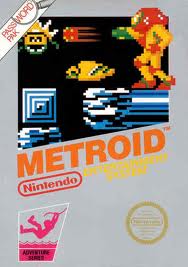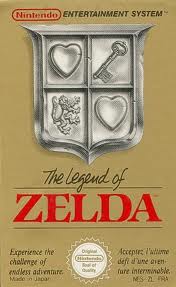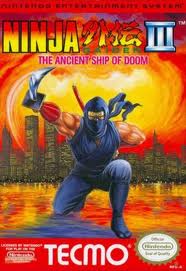(return to: website archives || main print issues website || minibooks)
order HOBART #12 now!
(out April 2011)
Metroid: An Appreciation
Mike Meginnis
![]()

by Douglas Silver
I received my NES as a gift from my uncle. It was sufficiently expensive at the time that the gift was to count for that Christmas and my next birthday, as well as those of my brother. I was glad to take the deal.
I was maybe seven or eight; I'm not sure. It was impossible at the time to judge how good a game would be except by playing it. The gaming enthusiast press was undeveloped -- most kids relied on Nintendo Power, a glorified corporate propaganda rag, for reviews, but the mainstream magazines weren't much better. The Nintendo Seal of Quality was close to meaningless. My father and I mostly chose our games by price, apparent popularity, and box art. These are some games that we bought this way:
by Debbie Graber
by Karl Taro Greenfeld
by Melinda Moustakis
by Etgar Keret
by Sean Adams
by Robert Baumann
by Aubrey Hirsch
by Roxane Gay
1 issue = $10 + s&h ($2.00)
Which is to say that box art was, even at its best, pretty terrible back then. The art for Metroid strikes me as especially misleading: the projectile Samus is launching looks totally unfamiliar, the arrangement of enemies is impossible (crawling guy in the air, flying guy on the ground), the sprites are more detailed than were those in the game, and the image is crowded, whereas Metroid was generally, even at its most intense, rather spare. Metroid might also have been called Zelda: Plus Mario, in Space. The Zelda franchise, which would become Nintendo's second-most beloved after Mario, had established a formula wherein your character explores a series of hidden dungeons in a massive, dangerous world, gaining in each dungeon a magical item that would aid him in his quest. This was a fantasy-flavored version of the oldest and most universal narrative in video games, which is this: You Get Better. Of course you already know about Super Mario Bros., a game in which you improved through skill, rather than accumulate equipment.
Metroid differed from these games in its total indifference to you as a player. While Bowser has kidnapped the princess before Super Mario Bros. begins, apparently content to wait as long as it takes for Mario to find and rescue her, Metroid's nemesis doesn't even recognize your existence. You're a bounty hunter, and you've been hired to find and destroy Mother Brain. Mother Brain does not know that you've been hired to kill her -- presumably, when Samus shows up in her chambers for the game's final battle, the game's boss isn't even really sure what's happening.
This isn't to say that you have the advantage simply because you've got surprise on your side: the planet Zebes can and will kill you without ever really trying. Though the game's monsters barely seem to recognize your existence, that doesn't seem to make them much less dangerous. Your most lethal enemy is the environment itself: the lava pits that burn Samus' life points steadily away, the difficulty of the map.
The level design itself speaks of a rather monstrous indifference to the player. In Zelda, everything is measured by the game's protagonist in a very literal sense: the enemy sprites are mostly the same size as his sprite, and a tile of the environment's graphics is exactly the amount of space his body occupies. A bush is the same size as Link, and so is a tree, and so is a stairway, and so is a statue, and so is a chest. The dungeons are also carefully designed not only to accommodate Link, but to be fun for Link: the puzzles are generally well-balanced, the exploration is usually logical, and if you need something in room X then it's probably hidden somewhere in room Y.
None of this is true in Metroid. None of your enemies look anything like Samus: they are their own strange shapes, their own alien sizes. They cannot be divided into those which are half her height and those which are her full height. Nor has Zebes been designed for Samus' convenience or enjoyment. The distribution of upgrades is often inscrutable, the item you need is rarely anywhere near the place where you need it, and it's easy to get in over your head fast. The world is not like a dungeon, nor is it quite as logical as a maze. It is simply itself, not meant for you, not designed around your entertainment: there are significant stretches of play wherein Metroid is not fun. These stretches enhance the sense of the game world as a real place. It's an alien planet, not a damn carnival. If Samus has to move herself through a tight passage by collapsing into a ball and then boosting herself up with a series of carefully-timed bombs, then that's what she'll do, no matter how tedious it is as a game mechanic.
The apparent hostility of the world, combined with the cold, contemplative music and Samus' total isolation -- even the player feels distanced from Samus in many ways, with her sprite occupying so little space on the screen, her body obscured by an androgynous, alienating space suit that made her appear to most players as more a robot than a woman -- lends the game a real sense of dread. That dread was only enhanced by its deliberate pace: players would often spend hours searching fruitlessly for new locations, unexpectedly finding hidden doors and passageways that lead to terrible new segments of the game. It was always possible that the player might die.
No other NES game would achieve this feeling of dread and loneliness. The next would be Super Metroid, on the SNES, and then the next would be Metroid Prime, on the Gamecube, though with each iteration, the evolving tenets of modern game design placed the unique atmosphere of the first game further beyond reach. Much of what makes Metroid special is, in fact, bad design. No one should have to put up with bombing literally every inch of a game in order to discover not only its secrets, but essential rooms and items. No one should have to play a shooter wherein the shooting is so frequently awkward. Your best strategy, when faced with a difficult monster, is to have terrific stores of life points (literally hundreds) and a lot of missiles. You stand there and you fire the missiles as fast as you can. Maybe you dodge the opponent's attacks and maybe you don't. It doesn't ultimately matter. It's important to the menace of Metroid that killing the enemies is genuinely difficult. That difficulty depends, however, on mechanics that simply are not fun.
*
To return to narrative, it could be said that the narrative of Metroid is ultimately, like that of Zelda, the oldest: You Get Better. This narrative is satisfying and unsatisfying for the same reason. It isn't true. While to children it makes at least a little sense, as we grow up the idea of improvement becomes less and less convincing, even as we need more and more to believe it. The best fiction tends to show at least some of its characters learning and growing, but in ways that better match our experience of life. Perhaps they learn something new, but at great cost. Perhaps they grow, but only after a harrowing experience that will haunt them forever. Improvement comes hand in hand with diminishing. In Zelda, you only ever improve. By the end, if you've played correctly, it can be genuinely difficult to die, whereas in real life, death is remarkably easy. In Metroid, improvement is still the goal and the ultimate arc of the game, but it's never easy, and death is never conquered. You never feel safe. Even once you've killed Mother Brain, Eden is not restored. Instead, Zebes begins to self-destruct. You have limited time to escape. It is possible, up to the very last second, to lose, even after having won.
Metroid feels, in many ways, like the only really adult game in the NES library. While Mario remains difficult and well-designed enough to keep my interest, the only NES game I can truly say I would like to experience again for the first time is Metroid. It is the only NES game whose name describes, for me, an emotion. Sadness, anger, horror, Metroid.
It is not difficult, however, to imagine ways in which one might improve the game. One route would be to make it more playable, more fun, more complex, more beautiful. That was the plan that lead to Super Metroid. Another route would be to make it worse, to break the game for art's sake. This was the idea that led me to write my story "Navigators," forthcoming in Hobart. I wanted to know how it would feel to play Metroid if it were not a game about things getting better. I wanted to know how it would feel to play a game about things getting worse. I imagined a Metroid where the hero was diminished by her power-ups, and where this diminishing was in fact the goal of the game. I called that game Legend of Silence.
Such a game would play very poorly. It's possible to imagine a game where your character loses powers that would be fun -- this would be a game about ingenuity, about learning to compensate for one's own limitations. The narrative of that game would be, You Get Worse, but It Makes You Stronger. Legend of Silence as described in the story is definitely not that game. By the end, the hero is literally crawling. She can barely move. This would not be fun. This is why it makes a better story than a game.
As for the characters in "Navigators," I based them loosely on myself and my father. The mother's absence is a necessary source of tension. I might talk more about these things, but you can't know me. You can't know my father. You can, however, know Metroid.
Arguably, the goal of Metroid is knowledge of Metroid. It quietly contemplates itself. You contemplate it also. Knowledge here is not mastery, though it is ultimately destructive.
*
A little research reveals that Samus is a woman because one of the game's creators said, "Hey, wouldn't that be kind of cool if it turned out that this person inside the suit was a woman?" The rest of the staff agreed, and a very brief sequence was added to the game's ending wherein Samus removed her helmet. If you completed the game quickly, she would also take off her armor, or even strip to her underwear. This rather limits the game's potential as a feminist text.
The revelation of her gender at the game's end, however, is quite interesting. The anxiety of exploration is always connected to the anxiety of otherness -- to explore a jungle, to chart a cave, to explore a planet, is often figured by our culture's (and Japan's) collectively male imagination as the exploration of a woman's body. What, after all, could be more alien, more menacing? The most frightening moment in Metroid is what happens when a metroid -- the soft, bulbous jellyfish-type creature at the heart of the story -- attacks Samus. The metroid takes you into its body. You have to bomb your way out. As a child, I imagined the wet suction of entering that monster's flesh. I felt tremendous relief on escape. How is a metroid like a woman? How is it like a vagina?
The game's final boss is called a mother.
And so there is a kinship with this astronaut or robot named Samus, a sense in the male player that he has conquered this unruly feminine planet with gun and bomb and missile. And yet he was a woman all along, the hero: and so then, at the height of his identification, was the little boy who played her. We thought we were mastering our fears. We learned that we were what we feared. That the fear was unnecessary. We learned that women also fear. We learned that we were women. The immediate division of femininity from otherness, of woman from alien, was a beautiful shock, simultaneously erotic and humanizing.
Is it possible that Metroid taught me to respect women, to empathize with them, to imagine myself as a woman? It is not, I think, impossible. The hostility I feel toward Metroid: Other M, the franchise's most recent incarnation, is deeper than I can explain. I have not played this game and I refuse to play it, because its narrative apparently revolves around Samus' need for the approval of the men in her life. It revolves around her need to be a mother. That's not the woman I know. That's not the woman I was, the woman I am.


